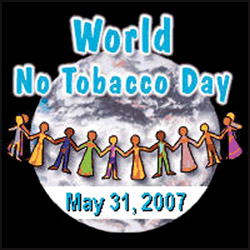
Make your environment smoke-free
You may remember the decision taken by
the government to prohibit smoking at public places. This is a very
appropriate decision as smoking is a bad habit that affects not only
those who resort to it, but all those who may be closeby.
The focus of this year's World No Tobacco Day (WNTD), which is
observed on May 31, is similar as the theme is 'Smoke-free
Environments'. Implementing 100 per cent smoke-free environments is
deemed the only effective measure to protect the public, including women
and children, and people at their workplaces, from being exposed to
tobacco smoke from other people.
Inhaling tobacco smoked by other people or second-hand tobacco smoke
(SHS) is known to be carcinogenic (cancer causing) in humans. It can also cause heart diseases and other
serious respiratory and cardiovascular diseases in both children and
adults, even resulting in death. This is all the more dangerous because
it could take place anywhere; in one's home, workplace or any public
place.
(cancer causing) in humans. It can also cause heart diseases and other
serious respiratory and cardiovascular diseases in both children and
adults, even resulting in death. This is all the more dangerous because
it could take place anywhere; in one's home, workplace or any public
place.
According to World Health Organisation (WHO) estimates, around 700
million children (almost 50 per cent of the world's children) breathe
air that has been polluted by tobacco smoke, especially at their homes.
A survey among students between the ages of 13 and 15 in 132
countries, conducted from 1999-2005, revealed that 43.9 per cent had
been exposed to second-hand tobacco smoke at home; 55.8 per cent had
been exposed to second-hand tobacco smoke in public places. Of the
participants in the survey, 76.1 per cent expressed support for banning
smoking in public places.
The International Labour Organization says at least 200,000 workers
die annually from being exposed to SHS at work. And there are no
acceptable levels of smoke inhalation either; ventilation or filtration
cannot do much to prevent people from inhaling smoke.
Smoking inside the workplace not only affects the health of the
workers, but also results in higher medical costs, productivity losses,
higher renovation and cleaning costs, increased risk of fire and even
higher insurance premiums.
It's a well-known fact that most smokers start this habit in their
teenage years. There has been an increase in smoking in low-income
countries and the WHO estimates that 70 per cent of the deaths from
smoking will occur in these countries. The worldwide death toll from
tobacco, which now stands at five million a year, is expected to double
to 10 million a year by 2030.
Many countries that have introduced legislation to ban smoking in
public places have seen lowered levels of tobacco consumption.
Introducing laws isn't enough however, they must be implemented as well.
Some countries have successfully implemented laws that require almost
all indoor workplaces and public places to be 100 per cent smoke-free.
Another important step is to make people aware of the dangers of active
and passive smoking and encourage them to give up. Education plays a
large role in this regard.
Peacekeepers of the world
All of you are likely to have heard about the United Nations. But how
many of you know about the UN Peacekeeping Forces? They are forces
personnel derived from UN member states and deployed to conflict areas
in different parts of the world to maintain peace. Many have died during
operations, far away from their motherlands.
Such personnel are honoured on May 29, which is the International Day
of UN Peacekeepers. The day was declared by the UN General Assembly in 2002, to pay tribute to all the
men and women who have served and continue to serve in UN peacekeeping
operations, for their high level of professionalism, dedication and
courage, and to honour the memory of those who have lost their lives in
the cause of peace.
declared by the UN General Assembly in 2002, to pay tribute to all the
men and women who have served and continue to serve in UN peacekeeping
operations, for their high level of professionalism, dedication and
courage, and to honour the memory of those who have lost their lives in
the cause of peace.
All UN member states, organisations of the UN system,
non-governmental organisations and individuals have been invited to
observe this day in an appropriate manner.
One of the prime objectives of the United Nations, as declared in its
Charter, is "to save succeeding generations from the scourge of war".
Its peace operations have been designed with this objective in mind and
incorporates three principal activities: conflict prevention and
peacemaking, peacekeeping, and peacebuilding. Peacekeeping, the largest
and most visible sector, was born almost six decades ago (the first UN
peacekeeping mission was established at the UN Headquarters in New York
in 1948), and has evolved rapidly in the past 15 years. |
